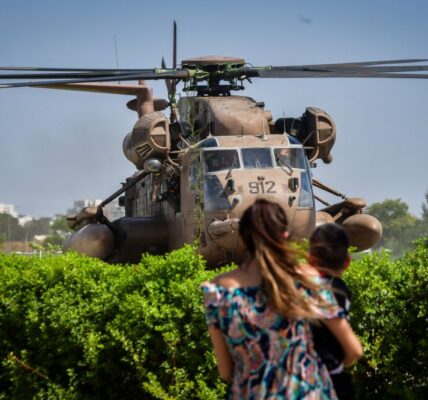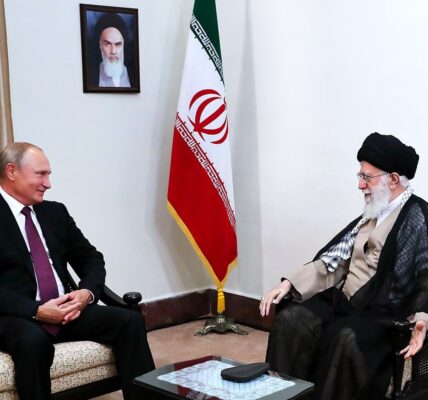Further Israel-Iran Escalation Averted… For Now: Israel Reeled Back, Iran realised It Can’t Win – Col Phil Ingram
Tension in the Middle East has teetered on a worrying precipice following a week of tit-for-tat missile strikes between Israel and Iran. The shadow war fought through proxy groups escalated with the world watching nervously, fearing that the conflict in the Middle East could escalate after Iran launched an unprecedented attack, firing 330 missiles and drones into Israeli targets. It was in response to Israel’s strike on an Iranian consular building in Damascus, in which two Iranian generals from the Revolutionary Guard were killed. After furious diplomatic efforts behind the scenes, Israel responded by launching ballistic missiles at an Iranian defence site near one of their nuclear facilities. Colonel Phil Ingram, a former British Army Intelligence Officer, said a further escalation has been averted… for now. Ingram says the last Israeli airstrike close to an Iranian nuclear site sent the message, “no matter how good you think you are, we can get through your air defences.” Ingram told National Security News that the diplomatic efforts by the West have managed to restrict Israel’s response. He also suspected that Russian President Vladimir Putin could have put pressure on Iran to stop an escalation, as he would not want Iran to start a war that would result in Iran’s arms manufacturing industry supplying weapons for the Iranian military instead of supplying Russia with weapons for its war in Ukraine. Iran, he said, has realised it can’t win. With Israel fighting conflicts on three fronts, Col. Ingram says Iran wouldn’t want to provoke Israel with its nuclear capabilities to say, “We can’t deal with this at the moment. We’re going to deal with it, in a very nasty and very quick way.” – Linda van Tilburg
“It wouldn’t surprise me at all if Putin got on the phone to the Grand Ayatollah and said, ‘Hey, look, stop. I don’t want you starting a war where you’re going to have to make sure your arms industry is doing nothing but feeding the Iranian military. I need you to keep supplying me stuff so I can continue my fight in Ukraine.”
Edited excerpts from the interview
Israel message to Iran: Now matter how good you are, we can get through your air defences
I think it’s just popped out of the news because there are so many other things happening globally. There has been a bit of reeling back of tension from the unprecedented Iranian attack involving over 330 missiles and drones against Israel.
This marks the first time Iran has directly attacked Israel. In response, Israel launched one or possibly two air-launched ballistic missiles, attacking an Iranian air defence site very close to one of their nuclear sites. Israel sent a clear message: No matter how good you think you are, we can get through your air defences, which is very clever.
That seems to have taken the tensions down we’re finding that the Iranian back proxies are trying to work out what they’re going to do. But, in the last 24 hours, the UK released a video showing precision-guided munitions being dropped on sites inside Iraq. that were potentially going to attack sites owned by Iranian-backed militias inside Iraq that were going to attack allies.
We’re seeing little bits and pieces going on elsewhere. We’ve had the UK’s HMS Diamond again shooting down a Houthi anti-ship ballistic missile in the last few days. So, what we’re likely to see is the resetting of activity by those Iranian-backed militias but they are very careful.
We have to remember the latest spats all started with the Israelis killing the regional head of the Iranian Revolutionary Guard Corps and their Quds Force, the man who was responsible for coordinating all of these little disparate groups, in their activities against the international community and Israel.
Politically, Israel has reeled back a little bit. They’ve allowed the situation to reset. They were going to carry out further attacks into Gaza to try and clear the last elements of Hamas from their strongholds. They seem to have held back a little bit from that, but artillery strikes and airstrikes are occurring.
They’re just not hitting the press in the same sort of way because the press attention is on Joe Biden’s commitment of another $61 million to Ukraine wrapped up in the package that was announced, which is another multi-billion-dollar aid package to Israel as well. Additionally, Donald Trump is in court as well. So, that takes up the rest of the headlines.
So, while activity in the Middle East has eased off a little bit, there’s still lots going on. It’s just the international news media has focused on something else for a bit.
Successful diplomacy, Iran bit off more than they can chew
Diplomatic efforts to curb Israel’s response have been successful
I think it’s been very successful indeed. it’s not just the military plan that’s in there. Um, it’s the diplomatic effort that’s going on behind closed doors as well to try and stop it. And Iran, I think, suddenly realised that, um, after they fired all the missiles, um, they’d bitten off more than they could chew.
I think it’s been very successful indeed. It’s not only military planning. It’s the diplomatic effort that’s going on behind closed doors as well to try and stop it. I think Iran suddenly realised that after they fired all the missiles, they’d bitten off more than they could chew.
We were very nervous for a period of time thinking that Israel was planning an overwhelming response. But the pressure from the international community, in particular, the Americans, but also the UK and others, will have made Prime Netanyahu sit back and think a little. Netanyahu is in a very difficult position. He has an extreme right-wing element to his government, and if the wing doesn’t support him, if he doesn’t appease them, his government falls. That would likely put him back in court with a real potential for jail time. So, he’s trying to appease both sides and I think he’s having real difficulty in doing that.
Iran is concealing the extent of the latest Israeli strike
Of course, Iran’s trying to conceal the extent of the attacks. Iran doesn’t want the Iranian people to know that Israel—with just two missiles, without interception—managed to penetrate their air defences all the way to a very sensitive and highly protected site. Israel chose that target deliberately.
Whereas when Iran attacked Israel it was by using just about every sophisticated weapon that they had perspective in their arsenal. Just about all of them were shot down, a few got through, but there was only one casualty and the international community came together.
I think that sent a significant statement to Iran. It wasn’t just the UK, the US, France, um, Germany, etcetera. The fact that Jordan got involved, that Saudi Arabia got involved somehow and I’ve read reports that Iraq was involved as well. So, that cabal of Middle Eastern countries coming together with the West will have made Iran have to sit up and go, actually, we need to reset and have a little look at this.
Of course, the information they’re putting out, that is one of the things Iran is very good at, and organisations they back are very good at information operations. They know they can achieve an awful lot more in the information sphere, not just focused on domestic audiences but also international audiences and Hamas are masters of that.
They’re giving the international community a master class in information operations and that’s why they are hurting Israel from a geopolitical perspective.
Iranian latest threats to Israel: Playing to a domestic audience
Yes, but that is to the domestic audience and when I talk about the domestic audience, I include the militias that Iran supports. So, Hezbollah, the different groups in Iraq and Syria, Hamas, Houthis, and all the rest of it, they have to be seen to be putting these big, strong, threatening statements out. It’s a very Soviet thing.
You see Putin doing the same when it comes to Ukraine, you see, Lukashenko has just in the last few days threatened the West with nuclear annihilation because he’s now got Russian nuclear weapons on his soil, and he’s decided that, therefore, if they’re on his soil, he can use them.
It’s all rhetoric, and it’s all information rhetoric, aimed at primarily the domestic audience. The Iranian international reaction, they were hit by at least two Israeli air-launched ballistic missiles and they haven’t reacted, and that shows that it’s all hot air. We have to be careful because relying on it to be hot air is not necessarily the healthiest of things to do.
Did Putin tell Iran to stop as an escalation would hurt the supply of weapons to the Russian leader?
Iran is probably one of the most sanctioned countries in the world, and their dual-use technologies are already heavily sanctioned. So, will the UK’s increase of sanctions against their drone companies have any effect? No, not really. But, again it’s sending that political, that geopolitical message. Iran is supplying Russia with all of its drones and I think this is where there’s an interesting link that hasn’t quite come out here.
I think whenever there was the potential for massive escalation in the Middle East, after Iran’s attack and then the West. reigning Israel back in again, the one person who’s relying on benefiting from Iranian technology, and weapons being provided to him, is Vladimir Putin.
It wouldn’t surprise me at all if Putin hadn’t got on the phone to the Grand Ayatollah and said, ‘Hey, look, stop. I don’t want you starting a war where you’re going to have to make sure your arms industry is doing nothing but feeding the Iranian military. I need you to keep supplying me stuff so I can continue my fight in Ukraine.”
We’ve got that link there and we’ve also got an Iranian-North Korean and a North Korean-Russian link. And then we’ve got China coming into it somewhere. So, there’s an international circle of things that are going on here. It’s that as much as anything else that’s suggested to Iran to hammer down a little bit for the moment.
It doesn’t mean it’s gone away and I don’t think it’s gone away in any way, shape or form. I can see it blowing up whenever people feel that that will be useful at any stage of the future because it will be so easy for them to light that proverbial blue paper again.
A full-scale war in the Middle East has been averted… for the moment
Well, I think that’s been averted for the moment and it’s a worry for NATO, but I also think it’s a worry as I was hinting to for Vladimir Putin and Xi Jinping, because if you look at Iran, you look at the control of the oil routes and the access to fossil fuels and natural resources Iran is key to what China’s doing and for China’s continued development.
It’s getting some from Russia. Russia’s generating a lot of its income, a lot of that’s going out through Iran. So, any disruption to that would have an impact on what China is trying to do, but it would also have another massive impact on what Vladimir Putin tried to do inside Ukraine.
It would open up a sort of second front for NATO with NATO supporting Ukraine. Putin wants that to happen in a way that keeps NATO heavily distracted, but not to the point where it then will stop any supply of weapons and cash and everything else going back into the Russian economy because that would cause him greater difficulties.
So, it’s getting that balance. Maybe I’m giving our global leaders a little bit too much, suggesting that they’ve got some form of sophisticated planning and control behind this. But I do think there’s some because what’s happening is a little bit too clever.
Iran realised it can’t win, the danger of Israel upping the ante
I do think there’s more cooperation going on than necessarily, we probably debated about it in the press but Iran realised that it can’t win. And of course, we’ve got the nuclear angle. Iran hasn’t quite got nuclear weapons yet. If it had, Israel would have attacked them.
Israel, whilst it doesn’t admit it’s got weapons, the international community is pretty certain that Israel has a number of nuclear weapons, and therefore Iran doesn’t feel as if it’s in a position to start an all-out war with Israel, whilst Israel’s fighting on three fronts at the moment.
In the north with Hezbollah, with Hamas in Gaza and an internal security fight, in the West Bank. The West Bank is very much of Israel’s creation but it’s still a third front for them.
So, Iran wouldn’t want to provoke Israel into going, ‘We can’t deal with this at the moment. We’re going to deal with it, in a very nasty and very quick way.’ Netanyahu is as extreme a government as the rest of them, it could be in the mind to do that very quickly indeed.
















































































































































































